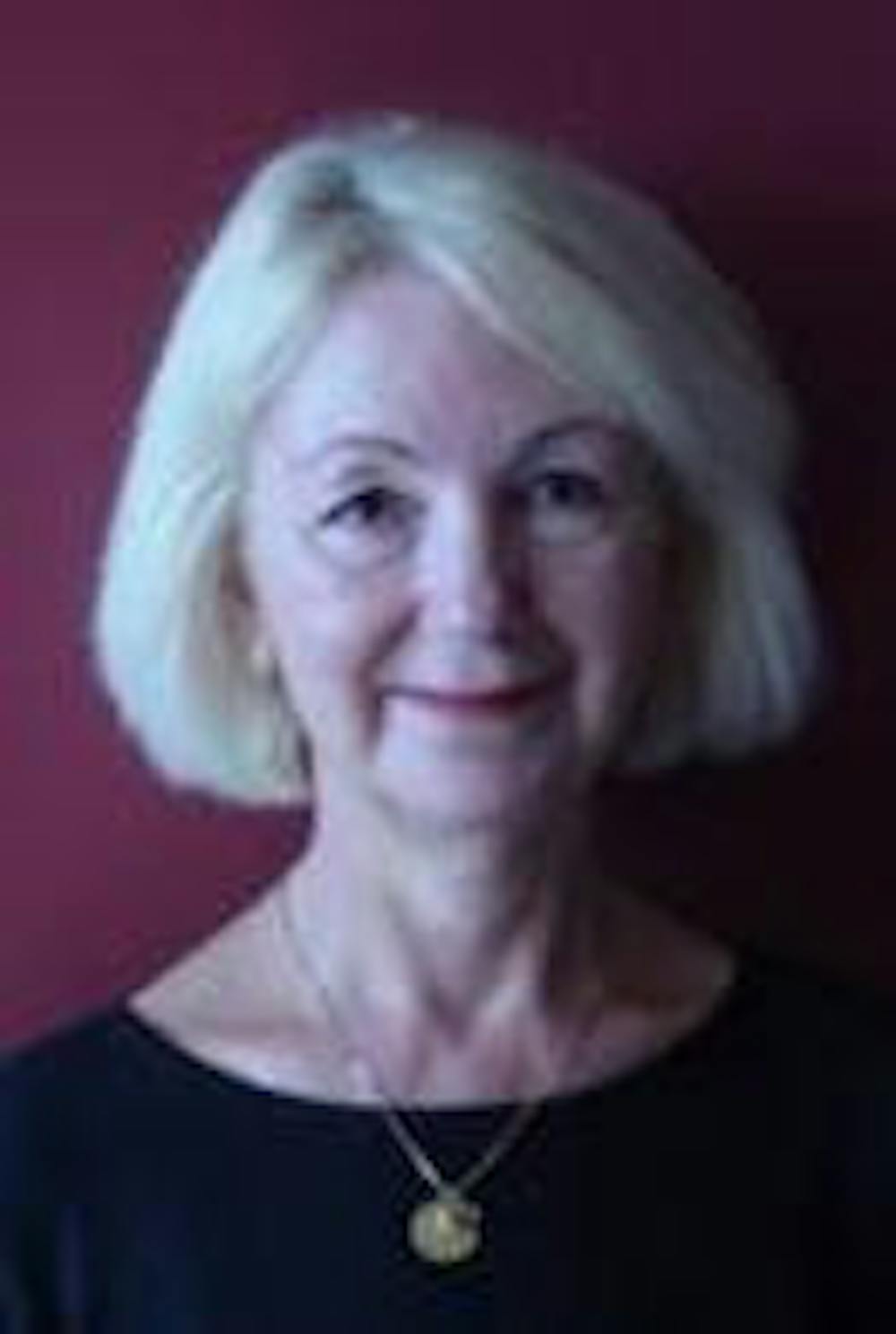Professor Emerita of English Mutlu Konuk Blasing, 77, died peacefully Aug. 16 in her summer home in her native country of Turkey. Blasing left behind a deep impact on the scholarship of poetry, and she was known by family, friends, colleagues and students for her intellect, honesty and dedication to her work.
The Herald spoke with several of Blasing’s family and colleagues in the months since her death about her legacy and character.
“Mutlu had a deep understanding of human nature. She loved people, loved listening to them and had strong opinions on all kinds of things,” wrote Suzie Nacar, currently lead IT support consultant and formerly a computing coordinator for the English department, in an email to The Herald. “Get her started and she would be eloquent about history, world events, politics, classic movies, religion and of course poetry. She was a dear friend.”
During her time at the University, Blasing established herself as someone who loved poetry and undergraduate teaching, and moreover a professor who challenged her students to look beyond standard understandings of poetry.
“I think everyone on Earth loves poetry, but Mutlu understood the possibilities of it in ways that most lovers of poetry don’t even grasp,” said David Ben-Merre PhD’08, professor of English at SUNY Buffalo State and a former student and close friend of Blasing. “She understood the potentials of all of the quirks of poetry: sounds, echoes, pauses, enchantments, lineation, stanza forms. … Poetry was central to her understanding of everything else in the world.”
Over nearly four decades of professorship, Blasing’s expertise in the field of American modernist poetry solidified her as a foundational professor in the University’s English department. Blasing’s academic legacy is survived by the “sheer number of people whose dissertations she’s advised, the large number of doctoral students she had,” said Randy Blasing, poet, translator and former husband of Blasing.
It was one of Blasing’s former undergraduate students who first informed the English department of her passing, a testament to her deep connection with students, according to Chair of English Richard Rambuss.
“She was a very kind instructor. She was very good at listening to students,” Ben-Merre said. “We became friends after I finished my degree in 2008. … We would have great email exchanges throughout the year. She was always keeping me on my toes — it wasn’t the type of discussion where you could just say, ‘Hey, how are you?’ They were always fun and thoughtful. … We would email back and forth over clever crosswords or language games.”
For Catherine Imbriglio MA’88 PhD’95, senior lecturer emerita in English, her relationship with Blasing transformed from that of one between dissertation director and student to one between University colleagues.
“She helped me get my first academic publication. I owe her a lot of gratitude and thanks,” Imbriglio said. As colleagues, “I remember laughing with her over why we were doing what we were doing. She was always outside smoking — sometimes I would stand outside and talk with her. We were always kidding with one another about our love of poetry and getting excited when John Ashbery was coming and talking about our rivalry with certain other critics.”
Blasing had a hand in hiring Associate Professor of English Ravit Reichman, who called this a “debt that cannot be repaid.” Reichman similarly remembers moments with Blasing while smoking outside.
“Back in the days, she and I would stand outside in the bitter cold in front of the English department, joking about how nobody smoked anymore,” Reichman said. “There was something delicious about finding that stolen time with her outside the department. It felt like the world was changing, and we missed the companionship.”
For many of her colleagues, what made Blasing such a compelling figure was her honesty and directness.
Students “could take her at her word, and her word was always good,” Randy Blasing said. “I certainly admired that, and her students came to admire it too.”
“She was a no-BS person, no-BS teaching,” he added. “She could laugh, too, but she was definitely serious about her work.”
Reichman describes Blasing with a certain intensity and “razor-sharp precision” that is often associated with people who work on poetry. She had “an incredible toughness to her,” as well as a “certain softness,” Reichman said. “She made me more comfortable being myself, being genuine with her and with others.”
While Blasing’s intense passion for undergraduate education was a defining marker of her dedication to poetry, much of her life was supplementarily focused on the poetry world outside of the University setting.
Beginning in the mid-70s, Blasing would spend her summers in Turkey with Randy Blasing, translating the work of the well-known Turkish poet Nazim Hikmet, whose poems had not yet been introduced to the English-speaking world.
Blasing’s connection to her native country and tongue allowed her special insight into how to do Hikmet’s work justice. In Turkey, she had access to archives which could help determine issues of history and language, in addition to Hikmet’s contemporaries, whose living memories often gave insight into the poet’s work.
For Randy Blasing, his most memorable interactions with his former wife took place while working on these translations. “We got into some pretty heated arguments. As a perfectionist and a person who knew Turkish, she knew ‘This is how it’s got to be,’ and as a poet, I’d say, ‘No, it’s got to be this way,’” he reminisced. “I really liked those interactions, … as fractious, as calamitous as some of them were. … We’d probably still be arguing till our last breath.”
Blasing published eight volumes of translations with her former husband, including “Human Landscapes from My County: An Epic Novel in Verse” and “Poems of Nazim Hikmet.” She also authored multiple books critiquing poetry, published by the likes of Yale, Cambridge and Princeton.
“She was really smart. … Considering she was working in a second language, she went from not knowing English to writing about great American poets,” Randy Blasing said. “She never gave up — she worked until she got it right and her books showed it. … She was demanding of herself. She was a perfectionist.”
Imbriglio cited Blasing’s “Lyric Poetry: The Pain and Pleasure of Words” as the work she admires most and wishes received more recognition.
“I was always in awe of her. She was a brilliant woman,” Imbriglio said. “‘Lyric Poetry’ is truly helpful for those of us that want to learn to write poetry. It’s one of the most important theoretical takes on poetry; it’s dense and rigorously argued, and it has many facets. … I think a number of people who are writing today would admire what she’s doing in that work.”
According to Jonathan Culler, professor of English and Comparative Literature at Cornell, who refereed the book, it is Blasing’s “refreshing insistence” against standard ideas of poetry that people in the field are most likely to remember.
Through both her scholarly work and the people she has influenced, Blasing’s impact has transcended international borders. A shared sentiment endures among her contemporaries, such as Professor of English Philip Gould ’83, that Blasing’s legacy must be remembered at the University level as well.
“I’d like to see the (English) department of the University organize something,” such as an undergraduate award or departmental speaker, in Blasing’s name to recognize her contributions to poetry at the University, Gould said.
Ben-Merre expressed similar thoughts, describing a recent push away from the study of poetry in academia. “I think she would want the study of poetry to continue in all of its facets,” Ben-Merre said. “Mutlu would want people to value and continue to approach poetry with new questions, treat it as a living document that has so much possibility.”

Alex Nadirashvili was the managing editor of multimedia and social media for The Brown Daily Herald's 133rd Editorial Board. As a former University News editor, he covered faculty, higher education and student life, though his proudest legacy is The Brown Daily Herald TikTok account.





